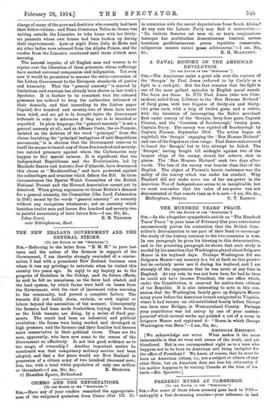THE HUNDRED YEARS' PEACE. [To rue Rams or TIM ••Sn,eeros.")
Stn,—In the altogether sympathetic article on "The Hundred' Years' Peace " in your issue of February 21st your contributor unconsciously proves his contention that the British Com- mittee's determination to use part of their fund to encourage the study of the history common to the two countries is wise.. In one paragraph he gives hie blessing to this determination, and in the preceding paragraph be shows that such study is- needed by his assertion that Washington played about Sulgrave Manor in his boyhood days. Perhaps Washington did see Sulgrave Manor—toy memory is a bit at fault on this point— but he certainly never saw it during his boyhood, and I am strongly of the impression that he was never at any time is England. At any rate, he was not born here, for had he been he could not have become President, the one office which, under the Constitution, is reserved for native-born citizens of the Republic. It is also interesting to note in this con- nexion that the Washington family gave up Sulgrave Manor many years before the American branch emigrated to Virginia, where it bad become an old-established family before George- was born near Bridges, in Westmoreland County. Perhaps your contributor was led astray by one of your contem- porm•ies' which several weeks ago printed a cut of a room in Sulgrave Manor and captioned it: "Room in which George- Washington was Born."—I am, Sir, &c., AMERICAN RESIDENT.
[We acknowledge our error. What makes it the more inexcusable is that we were well aware of the truth, and yet blundered. But is our correspondent right se to a 'man who. happen, not to be born on American soil being ineligible far the office of President ? We know, of course, that be must be• born an American citizen, i.e., not a subject or citizen of any other State, bat an American does not lose his citizenship if his mother happens to be visiting Canada at the time of hi.. birth.—En. Spectator.]














































 Previous page
Previous page